初一英语下册知识点
七年级下册英语必背知识点
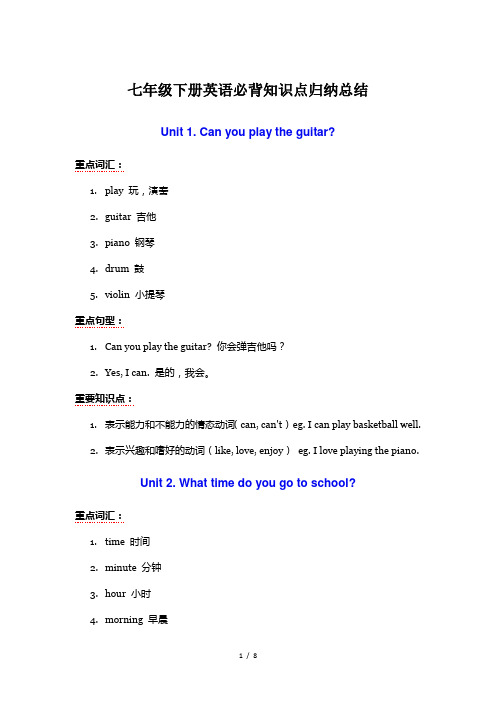
七年级下册英语必背知识点归纳总结Unit 1. Can you play the guitar?重点词汇:1.play 玩,演奏2.guitar 吉他3.piano 钢琴4.drum 鼓5.violin 小提琴重点句型:1.Can you play the guitar? 你会弹吉他吗?2.Yes, I can. 是的,我会。
重要知识点:1.表示能力和不能力的情态动词(can, can't)eg. I can play basketball well.2.表示兴趣和嗜好的动词(like, love, enjoy)eg. I love playing the piano.Unit 2. What time do you go to school?重点词汇:1.time 时间2.minute 分钟3.hour 小时4.morning 早晨5.afternoon 下午6.evening 晚上重点句型:1.What time do you get up? 你几点起床?2.I usually go to school at 7:30. 我通常七点半去上学。
重要知识点:1.表示时间的问答方式和用法eg. What time is it now? It's half past eight.2.表示日常生活习惯的一般现在时eg. I usually do my homework afterschool.Unit 3. How do you get to school?重点词汇:1.bike 自行车2.walk 步行3.bus 公交车4.subway 地铁5.taxi 出租车重点句型:1.How do you get to school? 你怎么去上学?2.I usually take the bus. 我通常坐公交车。
重要知识点:1.表示交通工具的名词和用法eg. I ride a bike to school every day.2.表示方式的副词和表达方式eg. He walks to work every morning.Unit 4. Don’t eat in class.重点词汇:1.don't do sth. 不要做某事2.eat 吃3.drink 喝4.talk 谈话5.listen 听6.music 音乐重点句型:1.Don't talk in class. 上课时不要讲话。
七年级下册英语知识点归纳总结

七年级下册英语知识点归纳总结一. 基础语法知识点:1. 一般现在时:表示经常性的动作或存在的状态。
2. 现在进行时:表示正在进行的动作。
3. 一般过去时:表示过去发生的动作或存在的状态。
4. 句型结构:主语+谓语+宾语,句子的基本结构。
二. 词汇知识点:1. 名词:表示人、事物、地方等的名称。
2. 动词:表示动作或状态的词。
3. 形容词:用来描述名词的特征或性质的词。
4. 副词:修饰动词、形容词或其他副词的词。
5. 代词:替代名词的词。
6. 介词:表示位置、方向、时间、原因等概念的词。
7. 冠词:表示名词前的特定限定关系的词。
8. 数词:表示数量的词。
9. 连词:连接词组、句子的词。
三. 日常生活用语:1. 问候与道别:Hello! How are you? Goodbye!2. 询问与回答:What's your name? My name is...3. 介绍与自我介绍:This is... I am...4. 请求与允许:Can I...? Sure. / Of course.5. 提醒与警告:Be careful! Watch out!6. 感谢与回答:Thank you! You're welcome!7. 道歉与回答:I'm sorry. That's OK.8. 邀请与回答:Would you like to...? Yes, I'd love to.四. 句式结构:1. 肯定句:主语+动词+宾语。
2. 否定句:主语+do/does/did not+动词+宾语。
3. 一般疑问句:Do/Does/Did+主语+动词+宾语?4. 特殊疑问句:特殊疑问词+一般疑问句结构。
五. 时态知识点:1. 一般现在时:主语+动词2. 现在进行时:主语+be+动词的-ing形式3. 一般过去时:主语+动词的过去式六. 定语从句:1. 关系代词:who, whom, whose, which, that2. 关系副词:where, when, why3. 用法:关系代词或关系副词连接两个句子,修饰先行词。
七年级下册英语各单元知识点归纳

七年级下册英语各单元知识点归纳七年级下册英语共有八个单元,包括Unit 1 Making a difference, Unit 2 Great people, Unit 3 Travel journal, Unit 4 Our world, Unit 5 Sharing, Unit 6 Animal world, Unit 7 Science and technology, Unit 8 Sports and health。
下面对每个单元的知识点进行归纳。
Unit 1 Making a difference:1. 基本动词的用法(is/am/are, have/has, do/does)2. 熟练掌握一般现在时的肯定句、否定句和疑问句的构造3. 可数名词和不可数名词的用法及其与冠词的搭配4. 形容词的基本用法5. 过去式动词的构成6. 宾语从句的引导词that的用法Unit 2 Great people:1. 一般过去时的肯定句、否定句和疑问句的构造2. 练习几个表示过去经历的词组和短语,如was/were, went to, saw, met, had等3. 表示习惯的副词 and used to的用法4. 形容词的最高级的构造及用法5. 练习几个形容词的比较级的构成及用法,如big-bigger, good-better, etc.6. 表示过去的时间状语的用法,如in 1998, last week, etc.Unit 3 Travel journal:1. 用there be句型描述地理位置,如There is a park in the town.第1页/共4页2. 学习有关城市、国家和世界各地的基本名称和信息,如countries, continents, cities, etc.3. 学习询问和描述位置的常用句型,如Where is...? It's in/on...4. 学习询问和描述交通方式的常用句型,如How do you go to...? I go by...5. 学习描述天气的常用句型,如What's the weather like? It'ssunny/cloudy/windy, etc.6. 学习描述食物的常用句型,如What do you want to eat? I want to eat...7. 学习描述节日和活动的常用句型,如Is there a...? Yes, thereis./No, there isn't.Unit 4 Our world:1. 学习地点介词的基本用法,如in, on, at等2. 学习描述日常活动的句型,如I get up at 7:00. He goes to school by bike, etc.3. 学习询问和描述时间的句型,如What time do you...? I... at...4. 学习表示频率的副词的用法,如always, usually, often, sometimes, never等5. 学习询问和描述日程安排的句型,如What's your plan for...? My plan is to...6. 练习定语从句的引导词和用法,如who, which, where, when等Unit 5 Sharing:1. 学习权限动词can的用法,表示能力、许可和请求2. 学习询问和描述个人能力的句型,如Can you...? I can...3. 学习谈论和分享个人喜好和兴趣的句型,如I like... I'minterested in...4. 学习询问和描述物品的价钱的句型,如How much is/are...? It's... They're...5. 学习询问和描述购物需求的句型,如What do you want? I want...6. 学习名词性物主代词的用法,如mine, yours, his, hers, etc.7. 学习问路和指示方向的句型,如Excuse me, where is...? It's on the left/right.Unit 6 Animal world:1. 学习动物的基本名称,如lion, penguin, tiger, elephant, etc.2. 学习描述动物外貌和特征的形容词,如big, small, tall, short, etc.3. 学习描述动物习性和动作的动词,如eat, run, swim, fly, etc.4. 学习用there is/are句型描述动物的句型,如There is a lion in the zoo.5. 学习询问和描述动物数量的句型,如How many... are there? There are...6. 学习询问和描述动物食物的句型,如What do... eat? They eat...7. 学习常见的动物园动物和其所属的科,如mammals, birds, reptiles, etc.8. 学习描述动物习性和栖息地的句型,如Lions live in Africa. They sleep in the daytime.Unit 7 Science and technology:1. 学习描述科技产品和设备的基本词汇,如mobile phone, computer, TV, etc.2. 学习询问和描述使用科技产品的方式的句型,如How do you...? I... with...3. 学习科技产品的功能和用途的句型,如What can it do? It can...4. 学习询问和描述科技产品的方便之处和不方便之处的句型,如Is it...? Yes, it is./No, it isn't.第3页/共4页5. 学习描述科技产品的发展和创新的句型,如In the past, people... Now, they...Unit 8 Sports and health:1. 学习描述运动和活动的基本词汇,如play basketball, swim, run, dance, etc.2. 学习询问和描述运动和活动的频率的句型,如How often do you...?I... every...3. 学习询问和描述运动的喜好的句型,如What sports do you like? I like...4. 学习询问和描述身体健康状况的句型,如How are you? I'm (I)have a headache, etc.5. 学习描述饮食习惯和作息时间的句型,如I usually... I go to bed at...6. 学习询问和描述健康建议的句型,如What should I do? You should...7. 学习询问和描述身体部位和病痛的句型,如What's wrong with you?I have a sore throat.以上是七年级下册英语各单元的知识点归纳,希望对你有帮助!。
七年级下册英语知识点整理

七年级下册英语知识点整理
七年级下册英语知识点整理
一.现在进行时
Ⅰ现在进行时的用法表示现在(说话瞬间)正在进行或发生的动作
Ⅱ现在进行时时间状语及标志性词
1now现在2atthemoment现在
3look看(后面有明显的.“!”)4listen听(后面有明显的“!”)
Ⅲ现在分词的构成
①一般在动词结尾处加ingEg:go—goinglook--looking
②以不发音字母e结尾的动词,去e加ing。
Eg:write—writingclose--closing
③以重读闭音节结尾的动词,如果末尾只有一个辅音字母,应先双写这个字母,再加ing.
Eg:get—gettingrun—running(swim,run,put,get,sit,begin)
Ⅳ现在进行时的构成
肯定句:主语+am/is/are+doing+其他+时状.Eg:Heisdoinghishomeworknow.
否定句:主语+am/is/are+not+doing+其他+时状.Eg:Heisnotdoinghishomeworknow.
一般疑问句:Am/Is/Are+主语+doing+其他+时状?Eg:Ishedoinghishomeworknow?
肯定回答:Yes,主语+am/is/areEgYes,heis.
否定回答:No,主语+amnot/isn’t/aren’tEg:No,heisn’t.。
七年级下册英语知识点总结归纳
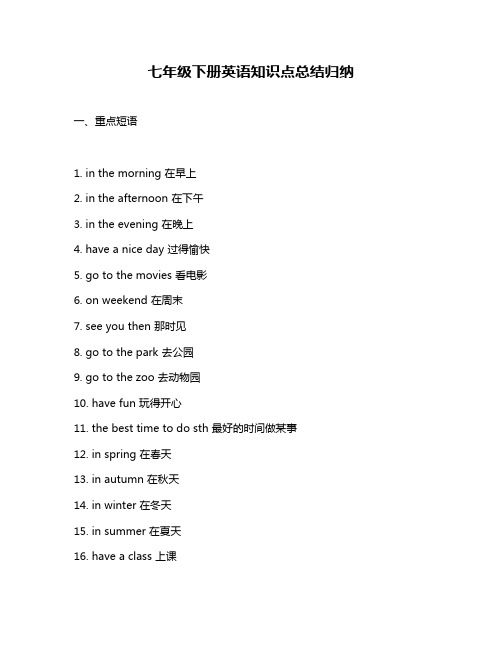
七年级下册英语知识点总结归纳一、重点短语1. in the morning 在早上2. in the afternoon 在下午3. in the evening 在晚上4. have a nice day 过得愉快5. go to the movies 看电影6. on weekend 在周末7. see you then 那时见8. go to the park 去公园9. go to the zoo 去动物园10. have fun 玩得开心11. the best time to do sth 最好的时间做某事12. in spring 在春天13. in autumn 在秋天14. in winter 在冬天15. in summer 在夏天16. have a class 上课17. have a swim 游泳18. have a picnic 野餐19. have a nap 小睡一会20. have fun playing with children 与孩子们一起玩耍21. the next day 第二天22. the day after tomorrow 后天23. the day before yesterday 前天24. the week after next 下下周25. the week before last 上上周26. three days ago 三天前27. two months ago 两个月前28. next Monday 下周一29. last Wednesday 上周三30. three weeks ago 三周前31. five years ago 五年前32. since 自从,因为。
表示一种因果关系,常跟完成时连用。
例如:since you were ill, I have kept you at home。
因为你病了,我一直让你呆在家里。
七年级下册英语单词知识点
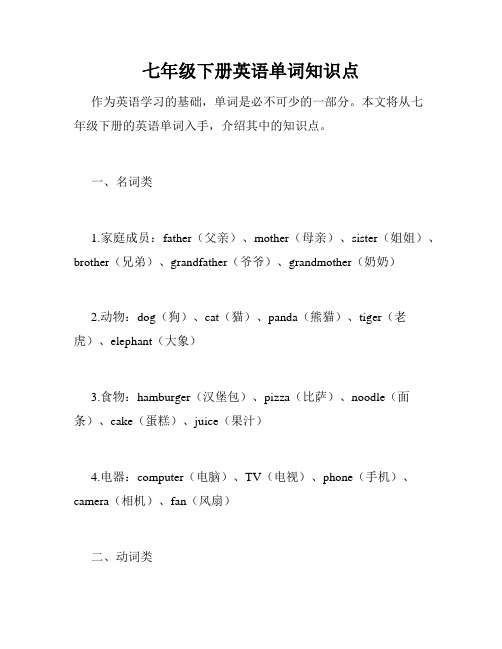
七年级下册英语单词知识点作为英语学习的基础,单词是必不可少的一部分。
本文将从七年级下册的英语单词入手,介绍其中的知识点。
一、名词类1.家庭成员:father(父亲)、mother(母亲)、sister(姐姐)、brother(兄弟)、grandfather(爷爷)、grandmother(奶奶)2.动物:dog(狗)、cat(猫)、panda(熊猫)、tiger(老虎)、elephant(大象)3.食物:hamburger(汉堡包)、pizza(比萨)、noodle(面条)、cake(蛋糕)、juice(果汁)4.电器:computer(电脑)、TV(电视)、phone(手机)、camera(相机)、fan(风扇)二、动词类1.基本动词:be(是)、have(有)、do(做)、go(去)、play(玩)2.日常动词:cook(煮)、clean(打扫)、wash(洗)、read (读)、write(写)3.系动词:look(看起来)、smell(气味)、taste(尝起来)、sound(听起来)、feel(触摸起来)三、形容词类1.颜色:black(黑色)、white(白色)、red(红色)、yellow (黄色)、blue(蓝色)2.形状:round(圆形)、square(正方形)、triangle(三角形)、rectangle(矩形)、oval(椭圆形)3.大小:big(大)、small(小)、long(长)、short(短)、tall(高)四、副词类1.时间:now(现在)、never(从不)、today(今天)、yesterday(昨天)、tomorrow(明天)2.程度:very(非常)、quite(相当)、a little(有点)、not at all(一点也不)、too(太)3.频率:always(总是)、often(经常)、sometimes(有时候)、seldom(很少)、never(从不)五、介词类1.方位:in(在里面)、on(在上面)、under(在下面)、above(在上方)、behind(在背后)2.时间:in(在某一段时间内)、on(在某一天或者具体时间)、at(在某一个时刻或者场合的时间)、after(在之后)、before(在之前)3.方式:by(通过)、with(携带)、like(像)、from(来自)、to(到)六、代词类1.人称代词:I(我)、you(你)、he(他)、she(她)、it (它)2.物主代词:my(我的)、your(你的)、his(他的)、her (她的)、its(它的)3.指示代词:this(这个)、that(那个)、these(这些)、those(那些)、such(这样的)以上就是七年级下册的英语单词知识点,希望对你的学习有所帮助。
七年级英语下册单元知识点总结
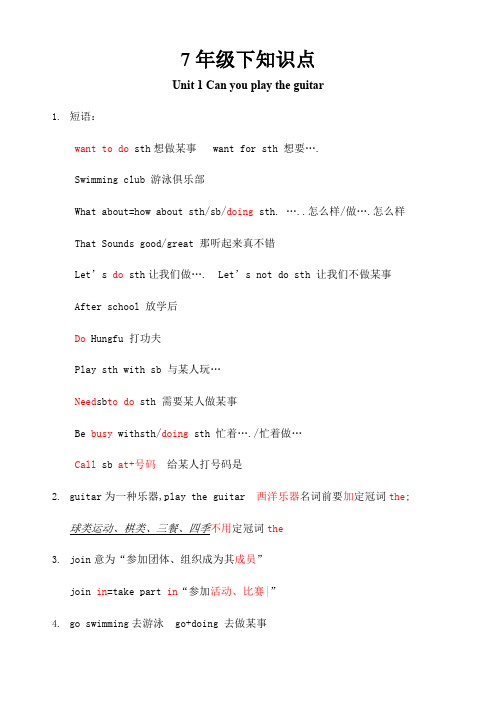
7年级下知识点Unit 1 Can you play the guitar1.短语:want to do sth想做某事 want for sth 想要….Swimming club 游泳俱乐部What about=how about sth/sb/doing sth. …..怎么样/做….怎么样 That Sounds good/great 那听起来真不错Let’s do sth让我们做…. Let’s not do sth 让我们不做某事After school 放学后Do Hungfu 打功夫Play sth with sb 与某人玩…Need sb to do sth 需要某人做某事Be busy withsth/doing sth 忙着…./忙着做…Call sb at+号码给某人打号码是2.guitar为一种乐器,play the guitar 西洋乐器名词前要加定冠词the;球类运动、棋类、三餐、四季不用定冠词the3.join意为“参加团体、组织成为其成员”join in=take part in“参加活动、比赛|”4.go swimming去游泳go+doing 去做某事5.注意区分:speak, say, talk和tella)①say说话 What can you sayb)②speak+语言c)③talk表示两个人或多个人在一起讲话、谈论多指随意谈论talk with sb与某人交谈 talk to sb 向某人说… talk about谈论…;d)④tell的意思是“告诉,讲述,吩咐”,讲故事或讲笑话多用tell;6.Show “表演,演出,出示……给某人看”, show sth. to sb.=show sb. sth.;7.show作名词,意为“展览,展出”on show “在展出” car show 车展;school show 学校公演fashion show 时装表演;a flower show花展8.help sth. 在……方面帮助某人help sth.帮助某人….. help sth.帮助某人干什么;a)I often help him do his homework.b)I often help him his homework.9.be good with... 与……相处得好;与……合得来=get on well withbe good at doing sth擅长做某事 be good for对……有益处;be good to sb 对某人好10.Can you play the guitar你能弹吉他吗情态动词:不能单独做谓语动词;无人称、单复数变化;后接动词原形1.表示能力能;会;如:He can speak English.他会说英语;2.表示许可,意为“可以”,这时可以和may通用,但是比may较正式;如:Can I use your pen我可以用你的钢笔吗3.表示可能性,意为“可能”,这时常出现在否定句中;如:It can’t be true.这不可能是真的;4.表示提供帮助;如:Can you help me你可以帮助我吗1.肯定句:主语+can+动词原形+其他;如:2.否定句:主语+can’t+动词原形+其他;如:3.一般疑问句:Can+主语+动词原形+其他肯定答语:Yes,主语+can.否定答语:No,主语+can’t.如:4.特殊疑问句:疑问词+can+主语+动词原形+其他如:What can I do for you我能为你做点什么呢Unit 2 What time do you go to school1.重点短语:get up 起床 get dressed 穿衣服 get on上车 get off 下车get home到达家中get to work到达工作岗位practice guitar 练吉它 practice doing sth练习做…leave home 离家take a shower = have a shower 洗淋浴澡have/eat breakfast/dinner/lunch 吃早、晚、午饭go to bed 睡觉反义词get upput on 穿衣服反义词take offdo one’s homework 做家庭作业tell sb. about sth. 告诉某人某事love to do = like to do 喜欢干某事 like doing sth at around/about six o’clock 六点左右in the morning/afternoon/evening 在早上/下午/晚上listen to 听…on weekends=at the weekend 在周末on school days 在学校上课日late for… …. 迟到了lots of =a lot of 许多a good /bad habit 好习惯take a walk=have a walk 散步live a happy life 过着幸福的生活2英语时间的表达What is the time 几点了It’s….1直接法:6:10 →six-ten 8:50→eight-fifty6:00 →six o’clocko’clock可省2借助介词to/past分钟数+to/past+小时小于等于30分钟“past” 超过10:15→ a quarter past ten或fifteen past ten 9:30→half past nine或thirty past nine大于30分钟“to”差….到….翻译时要注意时钟要加111:50→ten to twelve9:45→a quarter to ten或fifteen to ten3 what time与when的区别what time “几点”问的是具体的时间,回答要具体到小时;What time do you go to school你什么时候/几点上学when提问,回答既可以是具体的时间,也可以是不具体的时间,如:in the morning,last year,in 1998等范围大的时间;例如:When does he take a shower他什么时候洗澡He takes a shower in the morning.他在早上洗澡;也可用具体时间:I take a shower at 6 o’clock in the morning.我早上六点洗澡;3、 listen to, hear和sound△listen to意为“注意听”,表示有意识地去听,但不一定听得见什么,强调听的动作;They are listening to the teacher. 他们在听老师说;△hear意为“听见”,强调听的结果;如:I’m sorry to hear that.听到那个消息我很难过;△sound意为“听起来,听上去”,可作系动词+形容词The music sounds sweet. 这音乐听起来悦耳;Unit 3 How do you get to school1、重点短语搭配take the subway 乘地铁every day 每天think of 认为 think about 考虑between…and….在…和…之间 next to在旁边come true 实现I think so 我也这样认为I don’t think so 我不这样认为It’s easy /difficult for sb to do sth 对某人而言做什么是很容易/困难的it is easy to get to school到达学校很容易on a ropeway 坐缆索cross the river 穿过河流one 11-year-old boy 一个11岁的男孩红色部分为一个形容词I’m 11years old 我11岁quickly 动作上快 fast 速度上快 soon时间上快the river runs quickly 河水流的快ten minutes’ walk / a ten-minute walk =10 minutes on foot 10分钟的路be afraid to do/ be afraid of sth / doing害怕做某事why not +v原形 == why don’t you +v原形为什么不...........how to do it 怎么来做它what to do 做什么what do you think of =how do you like你觉得怎么样how long does it take sb to do sth花费某人多长时间做某事crossing the river is… 穿过河是…ing型动词做主语谓语动词用单数2、How do you get to school你怎样到达学校交通方式的表达:1 take/ride/drive + a/the +交通工具take a bus/car…2by +交通工具 by bus/car3on/in + a/the +交通工具in:封闭/半封闭/小型工具;on:大型4ride/fly/drive to +交通工具= go to +地点+by+交通工具walk to+地点= go to+地点on foot.eg: I drive to school every day.= I go to school by carI walk to school every day.= I go to school on foot3、spend, cost, pay 与 take区别(1)spendsb spend…on sth或spend…in doing sth.意为“某人花时间/金钱做某事”;eg: I spent 5 dollars on the book.=I spend 5 dollars buying the book.(2)coststh cost sb some money意为“某物花费某人多少钱”;eg: The skirt costs her 200 yuan.(3)paysb pay money for sth.意为“某人为某物付款”;eg: He paid 1000 yuan for the TV set.(4)takeIt takes sb time/ money to do sth.eg: It took him seven days to make the big cake.4、Then the early bus takes him to school.take…to…意为“把…带去…” bring….to….把…带来….5、how far用来提问距离,意为“多远;How far is it from A to B=How far is B from A A 到B有多远①用长度单位表示eg: —— How far is it from your home to the bus stop ——It’s five kilometers.②用时间表示eg: —— How far is the park from the shop——It’s ten minutes’ walk.6、how long 用来提问时间,意为“多久”;eg: —— How long have you been in America—— For two years. for+短时间表示“长达…”7、say, speak, talk与tell8、look, read, see与watch9、there be 句型就近原则There is no bridge=there is not a bride 这儿没有桥◆unit 4 Don’t eat in class.1、重点短语与句型on time准时 in time 及时fight for 为….而斗 fight against 为反对….而战斗 fight with 与…一起战斗go outsider 去外面It’s important for sb to do sth 对…人而言做…是很重要的practice sth/ doing sth 练习…/练习做…do the dishes 清洗餐具make bed 铺床be strict with sb 对某人严格remember/forget to do sth 记得/忘记要做…remember/forget doing sth 记得/忘记做过…follow the rules 遵守规则learn from sb/sth 从…..学习 learn to do sth 学会做某事be late for school 上学迟到have to 不得不don’t have to=needn’t 不必 must 的一般疑问句否定回答school uniform 校服on school nighs 在上学日的晚上too much+不可数名词“太多” too many +可数名词的复数“太多”much too + 形容词/副词“太….”in the kitchen 在厨房let/make/have sb do sth 让某人做某事good luck 好运keep+形容词保持… keep quiet 保持安静=be quietkeepsb doing sth 一直做某事 He keeps me waiting for him a long time. 他让我等了他很久keep sb from doing sth 阻止某人做某事have fun doing sth 很高兴做某事。
七年级下册英语知识点笔记

七年级下册英语知识点笔记
一、语法
1.动词时态:
-现在时:一般现在时、现在进行时、现在完成时
-过去时:一般过去时、过去进行时、过去完成时
2.情态动词:can/could/must/should/have to/had
better/would/may
3.定语从句:
-连接词:that/which/who/whom/whose
-引导词:when/where/why
4.疑问句转换:
-简单句:在句首加副词do/does/did进行肯定变否定;在句首
加is/am/are进行否定变肯定
-否定句:在句首加助动词do/does/did进行否定变肯定;在句
首加is/am/are进行肯定变否定
二、单词及短语
1.动词:play、talk、visit、teach、help、borrow、cook、write、take、study、stay、buy、wash
2.短语:in the morning、in the afternoon、in the evening、at night、at school、on TV、in the park、on the radio、at home、
at work、by bus、by train。
七年级下册英语知识点归纳总结
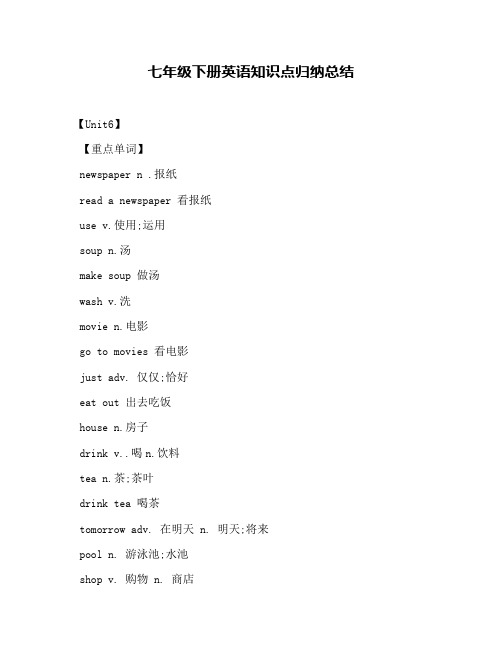
七年级下册英语知识点归纳总结【Unit6】【重点单词】newspaper n .报纸read a newspaper 看报纸use v.使用;运用soup n.汤make soup 做汤wash v.洗movie n.电影go to movies 看电影just adv. 仅仅;恰好eat out 出去吃饭house n.房子drink v..喝n.饮料tea n.茶;茶叶drink tea 喝茶tomorrow adv. 在明天 n. 明天;将来pool n. 游泳池;水池shop v. 购物 n. 商店supermarket n. 超市man n.男人;人race n.竞赛host n.主人;东道主study v./n. 学习;研究state n. 洲the United States 美国;美利坚合众国American adj. 美国的;美洲的 n. 美国人;美洲人 dragon n.龙Dragon Boat Festival 端午节any adj. 任何的,任一的 pron. 任何;任一other adj. 另外的;其他的 pron. 另外的人(或物) young adj. 幼小的,年轻的children n. 儿童miss v.怀念. 思念wish v. 希望delicious adj. 可口的,美味的still adv. 还.仍然living room 客厅【重点短语】1.watch TV看电视2. read a newspaper 看报纸3. talk on the phone 通过电话交谈4. listen to a CD 听CD5. a useful book 一本有用的书6. make soup 做汤7. wash the dishes 洗碟子8. go to the movies 去看电影9. at home 在家10. eat out 在外面吃11. drink tea 喝茶12.Dragon Boat Festival 端午节13. make zongzi 包粽子14. watch the boat races 看龙舟竞赛15. the night before the festival 节日前的晚上16. any other night 任何其他的晚上17. his host family 他的寄宿家庭18. read a story to sb 读故事给某人19. miss sb. 思念某人miss doing sth 错过做某事20. wish to do sth希望做某事wish sb to do sth希望某人做某事hope to do sth希望做某事21. no place like home 没有地方像家一样22. in the United States 在美国23. study for a test 为一个考试而学习【重点句型】1.一 What are they doing?他们在干什么?—They’re listening to a CD.他们在听光碟。
七年级下册英语单元知识点归纳完整版
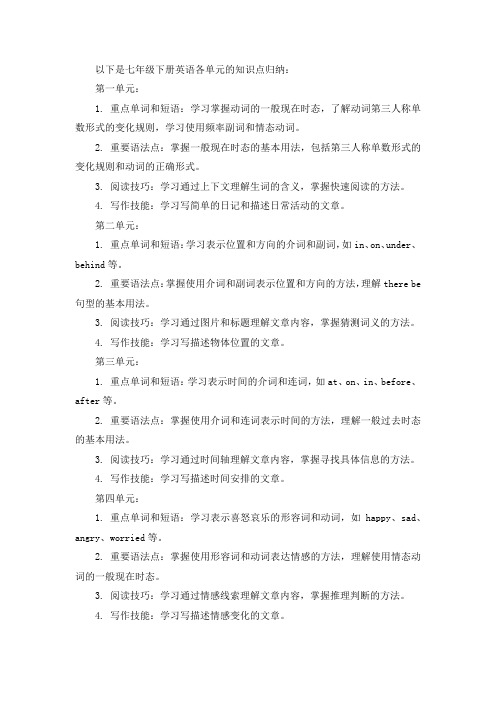
以下是七年级下册英语各单元的知识点归纳:第一单元:1. 重点单词和短语:学习掌握动词的一般现在时态,了解动词第三人称单数形式的变化规则,学习使用频率副词和情态动词。
2. 重要语法点:掌握一般现在时态的基本用法,包括第三人称单数形式的变化规则和动词的正确形式。
3. 阅读技巧:学习通过上下文理解生词的含义,掌握快速阅读的方法。
4. 写作技能:学习写简单的日记和描述日常活动的文章。
第二单元:1. 重点单词和短语:学习表示位置和方向的介词和副词,如in、on、under、behind等。
2. 重要语法点:掌握使用介词和副词表示位置和方向的方法,理解there be 句型的基本用法。
3. 阅读技巧:学习通过图片和标题理解文章内容,掌握猜测词义的方法。
4. 写作技能:学习写描述物体位置的文章。
第三单元:1. 重点单词和短语:学习表示时间的介词和连词,如at、on、in、before、after等。
2. 重要语法点:掌握使用介词和连词表示时间的方法,理解一般过去时态的基本用法。
3. 阅读技巧:学习通过时间轴理解文章内容,掌握寻找具体信息的方法。
4. 写作技能:学习写描述时间安排的文章。
第四单元:1. 重点单词和短语:学习表示喜怒哀乐的形容词和动词,如happy、sad、angry、worried等。
2. 重要语法点:掌握使用形容词和动词表达情感的方法,理解使用情态动词的一般现在时态。
3. 阅读技巧:学习通过情感线索理解文章内容,掌握推理判断的方法。
4. 写作技能:学习写描述情感变化的文章。
第五单元:1. 重点单词和短语:学习表示建议和请求的句型和表达方式,如Can you help me?、How about going shopping?等。
2. 重要语法点:掌握使用情态动词表示建议和请求的方法,理解使用一般现在时态的祈使句。
3. 阅读技巧:学习通过对话理解文章内容,掌握猜测词义的方法。
4. 写作技能:学习写建议信或请求信。
七年级下册1到6单元英语知识点

七年级下册1到6单元英语知识点
以下是七年级下册英语1到6单元的一些主要知识点:
1. Unit 1: Personal Information
-介绍自己的基本信息,如姓名、年龄、国籍等。
-问与回答关于个人信息的问题。
-学习使用形容词来描述自己和他人。
2. Unit 2: School Life
-学习和使用关于学校生活的词汇,如科目、课程表、校园设施等。
-学习描述日常活动和时间表。
-学习使用一般现在时来表达习惯和常规。
3. Unit 3: Hobbies and Interests
-学习和使用关于爱好和兴趣的词汇,如运动、音乐、艺术等。
-学习表达自己的喜好和不喜欢。
-学习使用动词的-ing形式来描述正在进行的活动。
4. Unit 4: Daily Routines
-学习和使用关于日常生活的词汇,如起床、吃早餐、上学等。
-学习描述日常活动的顺序和时间。
-学习使用一般现在时来描述日常例行事务。
5. Unit 5: Food and Health
-学习和使用关于食物和健康的词汇,如水果、蔬菜、饮食习惯等。
-学习表达食物的喜好和不喜欢。
-学习使用情态动词can和should来表达能力和建议。
6. Unit 6: Travel and Transportation
-学习和使用关于旅行和交通的词汇,如旅游景点、交通工具等。
-学习描述旅行计划和行程。
-学习使用一般将来时来表达将来的计划和打算。
七年级下学期英语各章节重要内容归纳

七年级下学期英语各章节重要内容归纳第一章:学校生活- 学科和教室- 学校设施和设备- 学校规则和制度- 课程时间表和课堂活动第二章:我的家庭- 家庭成员和亲戚关系- 家庭成员的职业和兴趣爱好- 家庭规则和家庭活动- 家庭成员之间的相处方式第三章:我的城市- 城市名称和地理位置- 城市景点和旅游景点- 城市交通和交通方式- 城市的文化和传统第四章:我的课余活动- 研究和爱好- 校外活动和俱乐部- 社交媒体和娱乐活动- 个人兴趣和追求第五章:购物和服装- 商店和市场- 购物的常用英语表达- 服装和时尚趋势- 参观商店和挑选服装第六章:健康和运动- 健康惯和饮食- 锻炼和运动方式- 平衡研究和休息- 保持健康的重要性第七章:节日和庆祝活动- 重要节日和传统俗- 节日庆祝活动和食物- 节日的意义和重要性- 节日庆祝的方式和惯第八章:环境保护- 环境问题和污染- 环境保护的重要性- 减少污染的方法和措施- 环境友好的生活方式第九章:世界各地的人们- 不同国家和地区的人们- 语言和文化差异- 人们的生活方式和传统- 尊重和理解不同文化背景的重要性第十章:未来的计划和梦想- 个人目标和职业梦想- 未来计划和学业规划- 实现梦想的方法和步骤- 努力和坚持的重要性以上是七年级下学期英语各章节的重要内容归纳。
每个章节都涉及不同主题,帮助学生了解和掌握相关的词汇和表达。
学生可以通过学习这些内容来提高英语水平和跨文化交流能力。
七年级下册英语知识点归纳总结

七年级下册英语知识点归纳总结七年级下册英语知识归纳1【重点短语】1. lost and found box 失物招领箱2. wele back 欢迎回来3. first of all 首先4. here is/are... 这有...5. from now on 从现在开始6. be careful with 小心保管7. whose bag 谁的包8. talk to sb. 与某人交谈9. mobile phone 移动电话,手机10. get on 上车 ( get off 下车)11. two thousand 两千 (thousands of 数以千计的...)12. look for 寻找13. at the moment 现在14. in a hurry 匆忙地15. alot of 许多,大量16. hundreds of 数以百计的17. on the train 在火车上18. every day 每天19. such as 例如20. make a list of 列一张...的清单21. ask/answer questions 问/回答问题【重点句型】1. Wele back to school! 欢迎回到学校!2. Whose bag is this? 这是谁的书包?3. It’s mine. 它是我的。
4. Are these crayons yours? 这些是你的蜡笔吗?5. Whose tapes are these? 这些是谁的磁带?6. Here’s a purple wallet! 这儿有个紫色钱包。
7. I think it’s Betty’s. 我认为它是贝蒂的。
8. Everyone, please be careful with your things from now on. 请大家从今以后仔细对待你们的东西。
9. People often lose things when they’re travelling or when they’re in a hurry. 当人们旅行或在匆忙中时,他们经常丢东西。
七下英语全书全部语法知识点总结

七下英语全书全部语法知识点总结Unit 1 Can you play the guitar?1. 情态动词+V原 can do= be able to do2. Play+ the+ 乐器+球类,棋类3. join 参加社团、组织、团体4. 4个说的区别:say+内容Speak+语言Talk 谈论 talk about sth talk with sb talk to sbTell 告诉,讲述 tell sb (not)to do sthTell stories/ jokes5. want= would like +(sb)to do sth6. 4个也的区别:too 肯定句末(前面加逗号)Either否定句末(前面加逗号)Also 行前be 后As well 口语中(前面不加逗号)7. be good at+ V-ing=do well in 擅长于be good for 对…有益(be bad for对…有害)be good to 对…友好(good 可用friendly,nice,kind替换)be good with和…相处好=get>8. 特殊疑问句的构成:疑问词+一般疑问句9. How/ what about+V-ing …怎么样?(表建议)10. 感官动词(look, sound, taste, smell, feel)+adj/ like11. 选择疑问句:回答不能直接用Yes或者No,要从中选择一个回答12. students wanted for school show(wanted表示招募,含有被动意义)13. show sth to sb=show sb sthgive sth to sb=give sb sth14. help sb (to)do sthHelp sb with sthWith sb’s help= with the help of sbHelp>15. be busy doing sth/ be busy with sth16. need to do sth17. be free= have time18. have friends= make friends19. call sb at +电话号码20.on the weekend= on weekends21. English-speaking students 说英语的学生(带有连词符,有形容词性质)22. do kung fu表演功夫Unit 2 What time do you go to school?1. 问时间用what time或者whenAt+钟点 at 7 o’clockat noon/ at night(during/ in the day)On+ 具体某天、星期、特指的一天on April 1st on Sunday on a cold winter morningIn +年、月、上午、下午、晚上2. 时间读法:顺读法逆读法:分钟≤30用pastfive past eight(8:05) half past eight(8:30)分钟>30用to a quarter to ten(9:45)整点用…o’clock 7 o’clock(7:00)3. 3个穿的区别:wear 表状态,接服装、手套、眼镜、香水等Put>Dress 表动作,接sb/>4. from…to…5. be/ arrive late for6. 频度副词(行前be后)Always usually often sometimesseldom hardly never7. 一段时间前面要用介词forfor half an hour for five minutes8. eat/ have… for breakfast/ lunch/ dinner/ supper9. either…or10. a lot of=lots of11. it is +adj+for sb +to do sth (adj修饰to do sth)It is important for me to learn English.it is +adj+of sb +to do sth (adj修饰sb)It is kind/ friendly/ nice of you to help me.12. 感叹句:How+adj+主谓!How+adj+a/an +n单+主谓!What+ a/an +adj+ n单+主谓!What+ adj+ n复/ 不可数+主谓!Unit 3 How do you get to school?1. 疑问词How 如何(方式)how long 多长(时间)答语常用“(For/ about +)时间段”how far多远(距离)答语常用“(It’s +)数词 +miles/ meters/ kilometers”how often多久一次(频率)答语常用“Always/ often/ every day/…”或“次数+时间”等表频率的状语How soon多快,多久以后,常用在将来时中。
七年级英语下册-全册知识点梳理
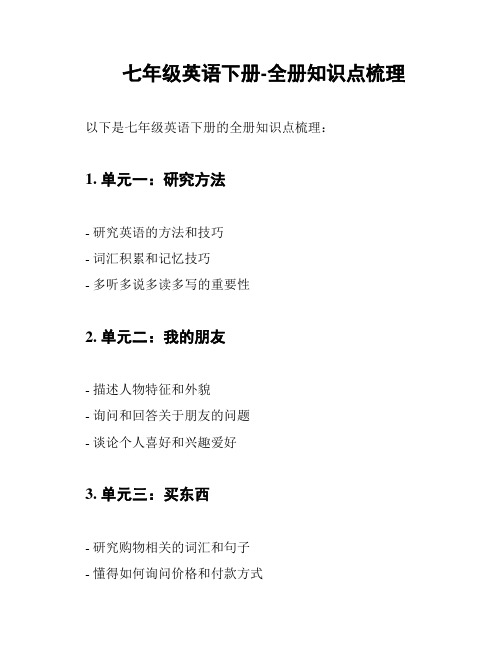
七年级英语下册-全册知识点梳理以下是七年级英语下册的全册知识点梳理:
1. 单元一:研究方法
- 研究英语的方法和技巧
- 词汇积累和记忆技巧
- 多听多说多读多写的重要性
2. 单元二:我的朋友
- 描述人物特征和外貌
- 询问和回答关于朋友的问题
- 谈论个人喜好和兴趣爱好
3. 单元三:买东西
- 研究购物相关的词汇和句子
- 懂得如何询问价格和付款方式
- 学会表达自己的购物意愿和偏好4. 单元四:我的学校
- 研究学校相关的词汇和句子
- 描述学校和课堂环境
- 谈论研究内容和学科
5. 单元五:我的生活
- 研究日常生活相关的词汇和句子- 描述自己的生活惯和家庭
- 谈论日常活动和时间安排
6. 单元六:我的假期
- 研究度假和旅行相关的词汇和句子- 描述过去和将来的假期计划
- 谈论旅行经历和感受
7. 单元七:我喜欢运动
- 研究运动项目和运动器材的词汇
- 喜欢和不喜欢的表达方式
- 谈论个人的体育运动经验和兴趣爱好
这份文档梳理了七年级英语下册的全册知识点,希望对你的学习有所帮助。
- 1、下载文档前请自行甄别文档内容的完整性,平台不提供额外的编辑、内容补充、找答案等附加服务。
- 2、"仅部分预览"的文档,不可在线预览部分如存在完整性等问题,可反馈申请退款(可完整预览的文档不适用该条件!)。
- 3、如文档侵犯您的权益,请联系客服反馈,我们会尽快为您处理(人工客服工作时间:9:00-18:30)。
初一英语知识点Unit 1 Where’s your pen pal from?一、重点短语1 .be from = come from 来自于----Is he from china ? 他来自中国吗?Does he come from china ?他来自中国吗?2. live in 居住在---3. on weekends 在周末4 .write to sb = write a letter to sb 给某人写信;写信给某人5 .in the world 在世界上in China 在中国6.pen pal 笔友14 years old 14岁favorite subject最喜欢的科目7.the United States 美国the United Kingdom 英国New York 纽约8.speak English 讲英语like and dislike 爱憎9.go to the movies 去看电影play sports 做运动10.like doing sth 一直喜欢做某事 like to do sth 突然喜欢做某事11.a little与little,few,a few的区别a little 与little 是接不可数名词 a little 有一点 little 几乎没有 a few 与 few 是接可数名词 a few 有一点 few 几乎没有二.重点句式:1 Where’s your pen pal from? = Where does your pen pal from/2 Where does he live?3 What language(s) does he speak?4 I want a pen pal in China.5 I can speak English and a little French.6 Please write and tell me about yourself.7 Can you write to me soon?8 I like going to the movies with my friends and playing sports. 三.本单元的国家,人民、语言对应。
1 Canada---- Canadian---- English / French2 France------ French------French3 Japan------Japanese----Japanese4 Australia----Australian----- English5 the United States------ American---- English6 the United Kingdom---British----- EnghishUnit 2 Where’s the post office?一. Asking ways: (问路)1.Where is (the nearest) ……?(最近的)……在哪里?2.Can you tell me the way to ……?你能告诉我去……的路吗?3.How can I get to ……?我怎样到达……呢?4.Is there …… near here / in the neighborhood? 附近有……吗?5.Which is the way to ……?哪条是去……的路?二.Showing the ways:(指路)1. Go straight down / along this street. 沿着这条街一直走。
2. Turn left at the second turning. 在第二个路口向左转。
3. You will find it on your right. 你会在你右手边发现它。
4. It is about one hundred metres from here. 离这里大约一百米远。
5. You’d better take a bus. 你最好坐公交车去。
(You’d better+动词原形)三.词组1. across from …… 在……的对面 across from the bank 在银行的对面2. next to…… 紧靠…… next to the supermarket 紧靠超市3. between……and…… 在……和……之间between the park and the zoo 在公园和动物园之间among 表示位于三者或三者以上之间4. in front of…… 在……前面 There is a tree in front of the classroom.课室前面有棵树。
in the front of…… 在……(内)的前部 There is a desk in the front of the classroom.课室内的前部有张桌子。
5. behind…… 在……后面 behind my house 在我家后面6. turn left/ right 向左/右拐on the left/right of…… 在某物的左/右边 on the left of our school 在我们学校的左边on one’s left/right 在某人的左/右边 on my left 在我左边7. go straight 一直走8. down /along…… 沿着……(街道) down/along Center Street 沿着中央街9. in the neighborhood=near here 在附近10 welcome to…… 欢迎来到……11. take /have a walk 散步12. the beginning of…… ……的开始,前端at the beginning of…… 在……的开始,前端in the beginning 起初,一开始13. have fun=have a good time=enjoy oneself 玩得开心,过得愉快我昨天玩得很开心。
I had fun yesterday.I had a good time yesterday.I enjoyed myself yesterday.14. have a good trip 旅途愉快15. take a taxi 坐出租车16. 到达:get to +地方get here/ there/ home 到这/那/家arrive in +大地方 I arrive in Beijing.arrive at +小地方 I arrive at the bank.reach +地方17.go across 从物体表面横过 go across the street 横过马路go through 从空间穿过 go through the forest 穿过树林18.on + 街道的名称。
Eg: on Center Streetat + 具体门牌号+街道的名称 Eg: at 6 Center Street三.重难点解析1.enjoy doing sth 享受做某事的乐趣,喜爱做某事I enjoy reading. 我喜爱读书。
到目前为止,我们学了两个特殊的动词finish和enjoy,都是要带 doing.I finish cleaning the room. 我扫完了这间屋子。
2.hope to do sth 希望做某事 I hope to pass this exam. 我希望通过这次考试。
hope +从句 I hope tomorrow will be fine. 我希望明天将会晴朗。
(从句即是一个小句子,这个小句子又放在大句子中,从属于大句子,所以叫从句。
如tomorrow will be fine是一个从句,它又放在I hope 的后面,形成句中有句。
)3. if 引导一个表示假设的句子。
If I have much money, I will go to the moon. 如果我有许多钱,我就会去月球。
If you are hungry, you can buy some food in the supermarket.如果你饿了的话,你可以在超市买一些食物。
四.本单元的反义词、近义词配对1new—old 2 quiet--- busy 3 dirty--- clean 4 big---- smallUnit 4 I want to be an actor.一.短语:1 want to do sth 想要作某事2 give sb sth = give sth to sb 给某人某物 / 把某物给某人3 help sb do sth 帮助某人作某事 Eg: I want to help my mother do some housework at home.4 help sb with sth 帮助某人谋事 Eg: I want to help my mother with some housework at home5 in the day 在白天6 at night 在晚上7 talk with/ to sb 和----谈话8 be busy doing sth 忙于做某事 Eg: He is busy listening to the teacher.9 in a hospital 在医院l10 work/ study hard 努力工作11 Evening Newspaper 晚报二.重点句式及注意事项:1 询问职业的特殊疑问词是what;有三种主要句式① What + is / are + sb?② What + does/ do + sb + do?③ What + is/ are + 名词所有格/ 形容词性物主代词 + job?2 People give me their money or get their money from me.3 Sometimes I work in the day and sometimes at night.4 I like talking to people.5 I work late. I’m very busy when people go out to dinners.6 Where does your sister work?7 then we have a job for you as a waiter.8 Do you want to work for a magazine? Then come and work for us as a reporter.9 Do you like to work evenings and weekends?10 We are an international school for children of 5-12.三.本单元中的名词复数。
